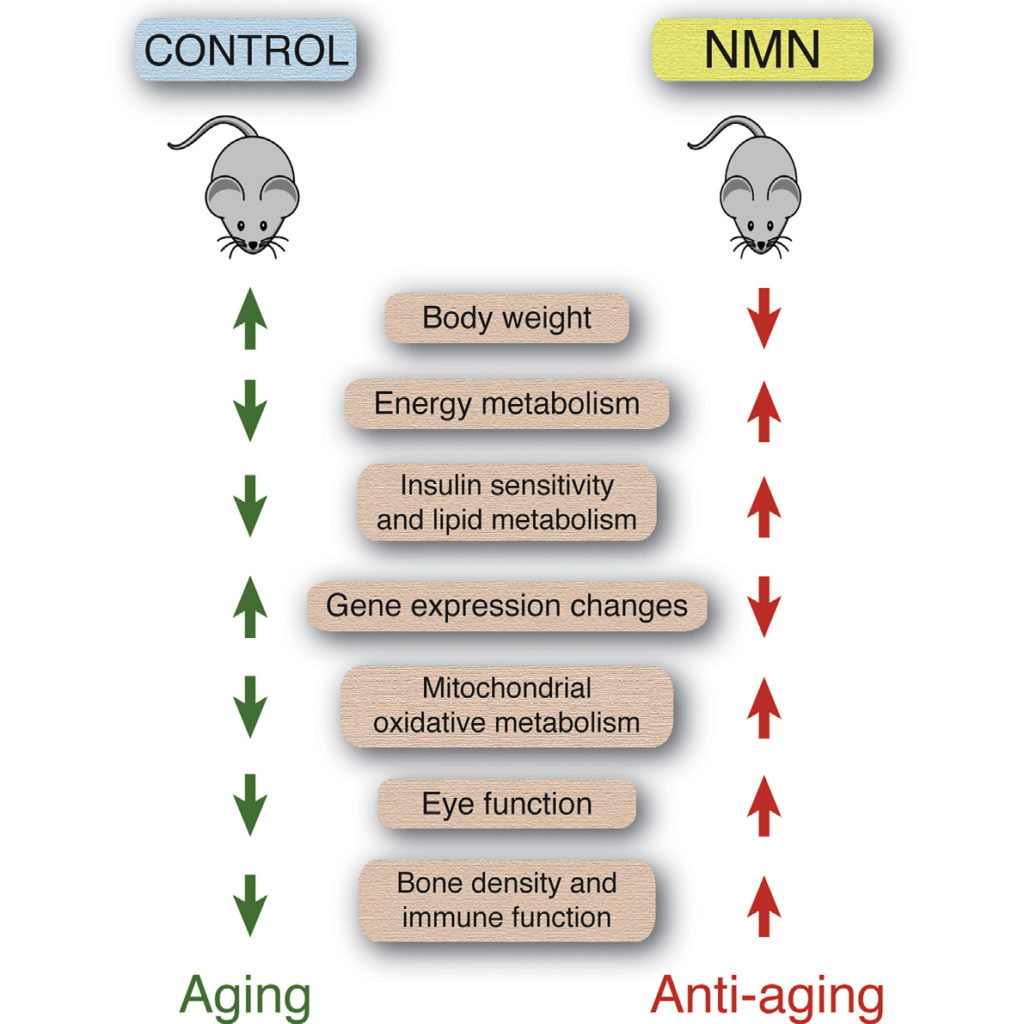Nicotinamide Mononucleotide Supplementation Extends the Healthspan in Mice
Boosting NAD+ level with natural compound, NMN, for 12 months reduces signs of aging in healthy mice
In 2018, for the first time in history, the number of people aged 65 or older surpassed the number of children under five globally. Today’s European babies are projected to live over 100 years old, along with over 5 million centenarians alive in Europe by the end of the 21st century. As people live longer and the older population becomes the majority, increasing one’s healthspan — staying as healthy as possible to the very end — becomes crucial.
Human health depends on the efficiency of energy production and utilization. However, cells’ ability to produce energy declines with age, which can lead to age-associated illnesses such as diabetes, cognitive impairment and heart diseases. By replenishing the loss of energy production with nicotinamide mononucleotide (NMN), scientists from Washington University School of Medicine in St. Louis reduced signs of aging in healthy mice.
“We have shown a way to slow the physiologic decline that we see in aging mice,” said senior author Shin-ichiro Imai of the Cell Metabolism study, in a statement. “This means older mice have metabolism and energy levels resembling that of younger mice. Since human cells rely on this same energy production process, we are hopeful this will translate into a method to help people remain healthier as they age.”
One of the key elements that drive energy production is called nicotinamide adenine dinucleotide (NAD+), a molecule that decreases with age. “If we are losing the capability of synthesizing NAD+, we can probably supplement it,” said Imai. However, past research has shown that the molecule is not effective when given to mice directly. The team had to find “something which can be converted to NAD+ and restore our body function.”
Imai and his team looked “one step ahead” at an NAD+ precursor — NMN — a safe, natural compound found in various foods such as broccoli, cucumber, avocado and tomatoes. The researchers fed the mice with NMN-mixed water. Within two and a half minutes, the compound appeared in the blood and was quickly converted into NAD+ in tissues. The study showed NMN absorption not only happens rapidly, but it can also enter the blood circulation and reach the tissues.
To determine the long-term effect of NMN, the team performed a 12-month long study in three groups of male mice. One group received a high dose of NMN-mixed water, another received a low dose NMN water and the third group received no NMN supplementation to serve as a control. Imai and his colleagues discovered that NMN was well tolerated over 12 months without showing serious side effects and obvious toxicity, suggesting the long-term safety of NMN.
NMN Alleviates Age-Related Physiological Decline
The research team discovered that “NMN is remarkably capable of ameliorating age-associated physiological decline in mice,” showing a variety of beneficial effects in “anti-aging.” The study showed NMN supplementation suppressed age-associated weight gain, enhanced energy metabolism, promoted physical activity levels, improved insulin sensitivity, ameliorated eye function and other benefits in mice. However, the effects are only seen in older mice.

The researchers conducted a 12-month-long administration of nicotinamide mononucleotide (NMN), a key natural NAD+ intermediate, to normal wild-type mice, demonstrating that NMN effectively mitigates age-associated physiological decline in mice without any obvious toxicity. These results highlight the significant potential of NMN as an effective anti-aging intervention in humans. Mills et al., 2016, Cell Metabolism
“When we give NMN to the young mice, they do not become healthier young mice,” Yoshino said. “NMN supplementation has no effect in the young mice because they are still making plenty of their own NMN. We suspect that the increase in inflammation that happens with aging reduces the body’s ability to make NMN and, by extension, NAD+.”
Although boosting NAD+ may sound like a panacea for all age-related diseases, some studies suggest the molecule’s possible role in promoting cancer-cell growth. “Some tumor cells are known to have a higher capability to synthesize NAD, so we were concerned that giving NMN might increase cancer incidence,” said Imai, whose team closely monitored the animals for potential cancer development during the study. “But we have not seen any differences in cancer rates between the groups.”
Scientists have been racing time to develop effective, affordable anti-aging interventions to make the process of aging healthy and prevent age-associated health problems. The research team believes that NMN‘s anti-aging effects may translate to humans one day, allowing people to age healthily.

